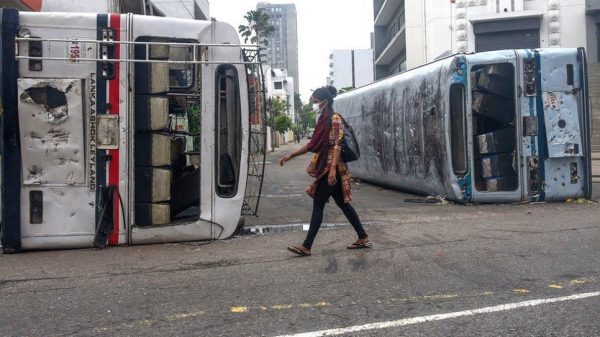Sri Lanka protests: Second night of property burnings

- Update Time : Friday, May 13, 2022
- 203 Time View

Sri Lanka witnessed a second night of arson attacks on Tuesday, with properties damaged in the town of Negombo, near the capital, Colombo.
A mob torched a luxury holiday resort owned by the son of the former Prime Minister, Mahinda Rajapaksa.
On Monday, frustration at the country’s economic crisis spilled over, after government supporters attacked protesters who want President Gotabaya Rajapaksa to quit.
Eight people have since died.
More than 200 are believed to have been injured in the clashes.
Sri Lanka had already seen weeks of protests over its dire financial situation, which has caused the Sri Lankan rupee to plunge, provoking severe food and fuel shortages.
On Monday night, mobs burned more than 50 houses belonging to politicians, reports say, while a controversial museum dedicated to the Rajapaksa family was also razed to the ground in the country’s south.
Shops, businesses and offices will be shut for a third day on Wednesday under a nationwide curfew in place until Thursday morning.
A meeting between Sri Lanka’s political party leaders has been moved online over security concerns.
The streets of Colombo bear the evidence of this week’s rioting – a heavy police presence, overturned and burnt buses.
Security forces have been ordered to shoot law-breakers and looters on sight, and thousands of them have been deployed to patrol the streets.
Nonetheless, protesters continued to gather at Galle Face Green, the main protest site in Colombo, on Tuesday evening. They insist President Rajapaksa has grossly mismanaged the economy and must stand aside.
The president’s older brother, Mahinda, stepped down as prime minister on Monday in a bid to placate demonstrators, but the move failed to bring calm.
President Rajapaska is holding talks with other political parties to form a new interim government. But the main opposition says it will not be part of the interim administration unless the president stands down.
At present, there is no clarity on which political parties will come together to form a government.
The political stalemate comes as Sri Lanka attempts to iron out a bailout package with the International Monetary Fund (IMF) – the $81bn economy is near bankruptcy.
It has suspended its foreign debt payments, largely because of loans from China that paid for massive infrastructure projects.
While the pandemic shrunk Sri Lanka’s earnings and foreign exchange reserves, experts say problems have been exacerbated by populist tax cuts in 2019 and a disastrous ban on chemical fertilisers in 2021 that hit crop productivity.
Protesters gathered in front of Trincomalee Naval Base in the north-east on Tuesday amid unconfirmed reports that Mahinda Rajapaksa had fled there with his family after escaping from his Colombo residence.
There have also been rumours that he and others in the family fled to India, which the Indian High Commission in Sri Lanka has denied.















